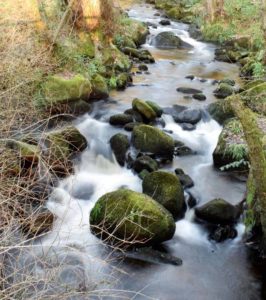Religion and Worldviews: A National Entitlement – Dr Kevin O’Grady
15 February, 2019, Dr Kevin O'Grady

This month’s blog represents a change from the ‘research of the month’ pattern. I’ve been invited to write about the Commission on RE’s first two recommendations – changing the name of RE to Religion and Worldviews and creating a statutory National Entitlement to the study of Religion and Worldviews for all publicly funded schools.[i] So why the photo of Padley Gorge, in the Peak District? Not, as you’ll see by the end, as a holiday snap, though I hope you like it.
Firstly, Religion and Worldviews, which, when the other recommendations in the set are considered, would obviously mean more than merely changing RE’s name. Some of the motivation appears to be to reflect the social reality of contemporary Britain, some to take away the ambiguity of ‘RE’. Non-religious worldviews are increasingly identified with, though not always on an organisational basis, so including these is a matter of accuracy and justice: religion continues to be the subject’s key focus, but it’s time to underline that it’s not about making people religious.[ii]
The changes are not just needed but overdue. In current research it tends to be how rather than if. I reflect on my career and ask whether it was fair to count pupils’ contributions to discussions as representing nonreligious worldviews whilst teaching about religious traditions was formally resourced and planned.[iii] Good teaching already includes individual worldviews by valuing pupil response, but we need more work on teaching non-religious worldviews at the organisational level. Once convincing case studies come in, those doubtful may be more convinced. I ask what pupils might say about such teaching, whether it might improve their motivation, whether it might help them to build knowledge and understanding of religion or improve their citizenship competences, all so far open questions.[iv]
I also ask about the framework for the study of non-religious worldviews and whether it can be common with that for religions,[v] as do the RE teachers whose views are reported in Judith Everington’s research.[vi] These teachers worry about lack of curriculum time and resources, but there is no sense that they are resistant to change: all 25 feel that non-religious worldviews should be included in RE, to build academic skills and social cohesion, and mainly to develop students’ own beliefs or spirituality.
The subject’s new identity should be viewed as an energising challenge. This brings me to recommendation 2, the statutory National Entitlement to the study of Religion and Worldviews. Would this mean a damaging increase to teacher workload? Not necessarily, provided other parts of the report are heeded, notably recommendation 3 and the setting-up of a national body to develop programmes of study.[vii] I would include an expectation that the national body provide guidance and resources aimed at ensuring that teachers are better supported than at present. Clearly this requires investment, as recognised in recommendation 7.[viii]
The Commission report is visionary and realistic. However, the Secretary of State’s ‘now is not the time’ response to the Commission report is neither visionary nor realistic, though we might hope for change in the next Parliament. Meanwhile, the problem with the status quo is that it isn’t one. It’s erosion, meaning further erosion. I don’t need to divert Padley Gorge, but if I did, I wouldn’t expect Padley Gorge to do it for me.
i Commission on Religious Education Final Report: Religion and Worldviews: The Way Forward. London (Religious Education Council of England and Wales) 2018 p.11.
ii Ibid. pp.6-7.
iii Kevin O’Grady, Religious Education as a Dialogue with Difference: Fostering democratic citizenship through the study of religions in schools. New York and London (Routledge) 2019 e.g. pp.3-4, 159-60.
iv Ibid. 197.
v Ibid.197.
vi Judith Everington (2019) Including nonreligious worldviews in religious education: the views and experiences of English secondary school teachers, British Journal of Religious Education, 41:1, 14-26. This research is also summarised at https://researchforre.reonline.org.uk/research_report/nonreligious-wor…ers-perspectives/
vii Commission on Religious Education Final Report: Religion and Worldviews: The Way Forward. London (Religious Education Council of England and Wales) 2018 p.14.
viii Commission on Religious Education Final Report: Religion and Worldviews: The Way Forward. London (Religious Education Council of England and Wales) 2018 pp.15-16.